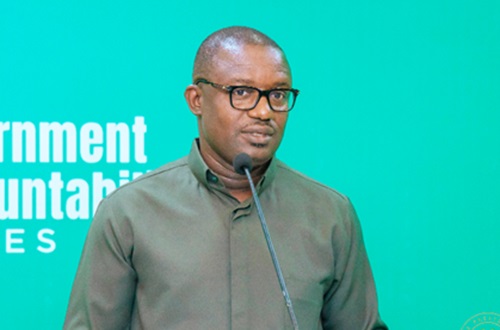The Minister of Energy and Green Transition has terminated 202 supply contracts of the Electricity Company of Ghana (ECG) after the suppliers failed to deliver goods on schedule.
The Minister, John Abdulai Jinapor, who made this known in Accra on Wednesday [ July 16], said the terminated contracts, which were quoted in various currencies, were worth $227.6 million, £1.17 million and €4.08 million.
Speaking at the Government Accountability Series press briefing at the Jubilee House, the Energy and Green Transition Minister said the move was part of a broader effort to reduce ECG’s contingent liabilities and improve its cost efficiency.
“After a thorough review, we identified 347 contracts where suppliers had failed to meet their obligations. The ECG Board has approved the termination of 202 of these contracts, as the delays were unacceptable," Mr Jinapor said.
The Energy Minister explained that the goods in the terminated contracts were not part of the materials locked up at the ports, but rather additional materials from past procurements by the previous administration that were yet to be delivered.
He added that the remaining 145 contracts were undergoing further scrutiny, with possible termination if the suppliers failed to justify the delays.
Context
The Energy and Green Transition Minister detailed the progress made since the new administration assumed office in January 2025 in revitalising the country’s struggling energy sector.
He also provided updates on reforms in power generation, renewable energy and petroleum production, signalling a new era of stability and growth for the sector.
Sector stabilised
Mr Jinapor revealed that Ghana had successfully restored a reliable electricity supply following months of erratic power outages, with consistent power delivery maintained over the past four months.
That achievement came after decisive interventions, including restructuring the sector’s massive debt, which had ballooned to $1.7 billion owed to Independent Power Producers (IPPs) alone.
To prevent further financial strain and potential shutdowns, he said the government enforced strict compliance with the Cash Waterfall Mechanism (CWM) to ensure timely payments to power generation companies.
“These efforts have yielded tangible results, with the Electricity Company of Ghana recording its highest-ever monthly revenue of GH¢1.678 billion in June 2025, a 47 per cent increase compared to the same period last year,” he added.
Mr Jinapor mentioned other reforms to include Cabinet’s approval of a new Private Sector Participation (PSP) model in electricity distribution, designed to improve efficiency and service delivery.
Additionally, he said, ECG had transitioned to a new billing system within just three months, streamlining operations and reducing commercial losses.
Renewable energy
With the ministry’s expanded mandate to include renewable energy, Mr Jinapor announced major strides in green energy adoption.
They include a flagship initiative, the $85 million Ghana Scaling-up Renewable Energy Program (SREP), set to deploy 12,000 solar PV systems, construct 35 mini-grids and distribute 1,450 solar home systems to remote communities.
He said large-scale solar projects were also underway, including a 25-megawatt (MW) floating solar plant at Bui Dam and a 30MW facility at Kpong, which were both expected to significantly boost renewable energy capacity.
The government is also advancing plans for electric vehicle (EV) infrastructure, with solar-powered charging stations already commissioned at the Energy Commission.
Mr Jinapor said the country had progressed to the second phase of its Nuclear Power Programme, with vendor selection for the country’s first nuclear power plant underway.
The Minister of Energy also reported that after five consecutive years of declining production, the country’s upstream petroleum sector was bouncing back.
He said two major oil discoveries, Afina and Eban-Akoma, had been declared commercially viable, paving the way for new production streams.
The government had also secured a $2 billion investment commitment for the Jubilee and TEN fields, which would fund the drilling of 20 new wells and associated infrastructure, he said.
Additionally, the Tema Oil Refinery (TOR), which had been non-operational for years, was set to resume operations in October 2025 following critical maintenance works.
In the downstream sector, the government was rolling out the Cylinder Recirculation Model (CRM) to distribute 450,000 liquefied petroleum gas (LPG) stoves, enhancing access to clean cooking solutions.
Plans were also in place to expand Ghana’s gas processing capacity with a second gas plant, which was expected to reduce reliance on expensive fuel imports by $1 billion annually, the minister said.
Mr Jinapor reaffirmed the government’s commitment to transparency, sustainability and industrial growth.
“We have stabilised power supply, increased petroleum reserves and initiated a comprehensive clean-up of the sector. While challenges remain, the foundation for a resilient energy future has been laid,” he said.

